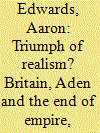| Srl | Item |
| 1 |
ID:
179334


|
|
|
|
|
| Summary/Abstract |
This article examines the phenomenon of Cambodian intellectual curiosity about China through the social experiences of Phouk Chhay, a prominent leftist activist-critic and Pol Pot's one-time secretary. Amid Phnom Penh's urban radical culture, Phouk transformed from rural student to Communist guerrilla. He associated with Communists, formed pro-China student associations, and through his networks, went on trips that left lasting impressions. This study draws from issues of the Cambodian-Chinese newspaper Mianhua ribao (Sino-Khmer Daily) and several forced confessions to tell a story of becoming that examines community and network in charting the course of ‘China-curiosity’ as intertwined with Phouk's life trajectory.
|
|
|
|
|
|
|
|
|
|
|
|
|
|
|
|
| 2 |
ID:
151837


|
|
|
|
|
| Summary/Abstract |
The Labour Government's decision to withdraw from Britain's overseas bases east of Suez in the 1960s had profound repercussions for British grand strategy. One of the last colonies to be evacuated was the port town of Aden, located on the south-western tip of the Arabian Peninsula. First seized by the East India Company on behalf of the British Empire in 1839, it became a Crown Colony almost a century later in 1937. By 1963, the British government had presided over Aden's entry into the fledgling Federation of South Arabia, a transitional body that was envisaged as a vehicle for independence. Drawing on the Labour's Party's archives, amongst a range of other sources, this article examines the shift in policy within the Labour government on the issue of Aden. It makes the case that, in contrast to the Conservative government's wholehearted support for Britain's tribal allies in South Arabia, Labour hedged its bets by balancing its policy off between the tribal rulers and the new radical nationalist opposition. By refusing to back the fledgling Federation government, Labour, instead, adopted a non-committal stance that would lead to greater strategic inertia in its policy towards the Middle East during the Cold War.
|
|
|
|
|
|
|
|
|
|
|
|
|
|
|
|